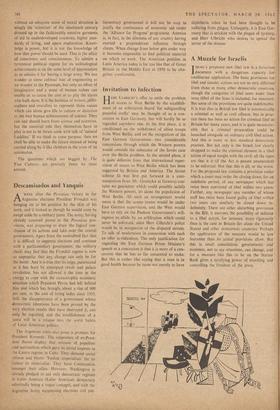Descamisados and Yanquis
AWEEK after the Peronista victory in the Argentine elections President Frondizi was hanging on to his position by the skin of his teeth, and it looked as though he would soon be swept aside by a military junta. The army, having already assumed power in the Peronista pro- vinces, was preparing to draw the logical con- clusion of its actions and take over the central government. Apart from the undoubted fact that it is difficult to suppress elections and continue with a parliamentary government, the military chiefs may feel that the Frondizi regime is now so unpopular that any change can only be for the better. And it is true that its reign, punctuated as it has been by attempted revolt and palace revolution, has not allowed it the time or the energy to cope with the castastrophic economic situation which President Peron had left behind him and which has brought about a rise of 600 per cent. in the cost of living index since 1955. Still, the disappearance Of a government whose democratic intentions have been proved by. the very election results that have destroyed it, can only be regretted, and the establishment of a junta will be a relapse into the worst habits of Latin American politics.
The Argentine crisis also poses a problem for President Kennedy. The supporters of ex-Presi- dent Peron display that mixture of populism and nationalism which gave its initial impetus to the Castro regime in Cuba. They demand social reform and blame 'Yankee imperialism' for its failure to materialise. They have Communists amongst their allies. However, Washington is already pledged to aid only democratic regimes in Latin America (Latin American democracy admittedly being a vague concept), and with the Argentine Army suppressing elections and par- liamentary government it will not be easy to justify the continuance of economic aid under the 'Alliance for Progress' programme. America is, in fact, in the dilemma of any country having exerted a preponderant influence through clients. When change from below gets under way it becomes impossible to find political material on which to work. The American position in Latin America today is far too like that of Great Britain in the Middle East in 1950 to be alto- gether comfortable.














































 Previous page
Previous page